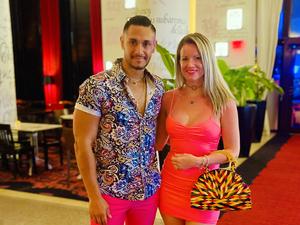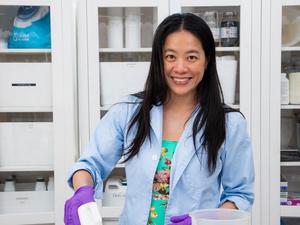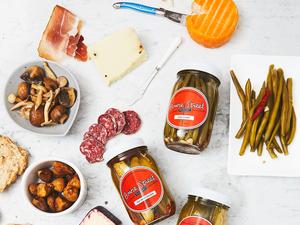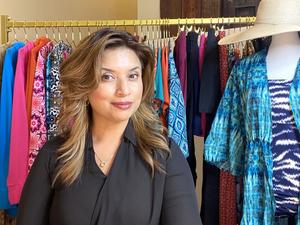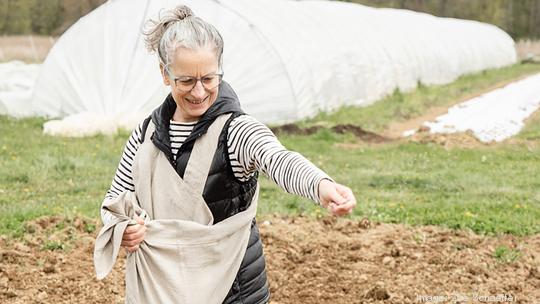
With a focus on Greater Philadelphia small businesses and entrepreneurs, "The Creators" is a weekly feature presented as a part of PHL Inno. Check back each Monday for a new profile on a local business. Have a story you think we should know about? Email associate editor Lisa Dukart at ldukart@bizjournals.com.
Heidi Barr likes to joke that she’s making a $5,000 napkin.
While the cost to produce what may one day be a napkin could end up being or exceeding $5,000, it’s all part of a visionary plan for helping bring the flax industry to Pennsylvania.
Barr, a former costume designer, is behind Wissahickon-based Kitchen Garden Textiles and one half of the team behind the Pennsylvania Flax Project.
Founded in 2012 under the name Kitchen Garden Series, Kitchen Garden Textiles was reimagined in 2015 into its modern iteration.
Through her company, Barr is focused on creating everyday household products made with sustainable textiles. The goal is to help combat waste and reduce plastic use. Made from reclaimed fabrics and linen, her products — napkins, coffee filters, towels, produce bags, tea bags and aprons — are durable alternatives to their mainstream counterparts.
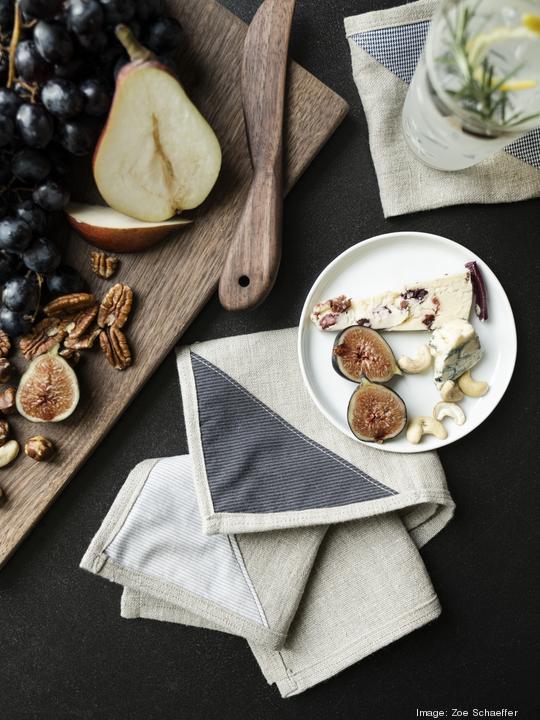
A dancer who suffered a career-ending injury, Barr transitioned to costume design, focused largely on dance. “I had a really particular understanding of the needs of the performers,” she said. Throughout her costuming career, Barr designed for area schools including Rowan University, Princeton University and Drexel University, where she also managed the costume shop for a time.
“I just started to create really a lot of product, a lot of costumes that were used for a very short period of time and then either stored indefinitely or eventually discarded,” Barr recalled. “I just kind of reached a point with it where I became uncomfortable with the amount of waste I was producing.”
She began researching alternative materials and took up a plot at community supported agriculture farm Henry Got Crops in Wissahickon Valley Park. “That's kind of where everything clicked together for me,” she said.
The idea to pursue her own business dawned on Barr when she was driving from one rehearsal to another. Stuck in traffic due to a fallen tree blocking the road, she remembers thinking, “This isn't what I wanted. This has gone awry.” Like the snapped tree in the road, it proved a breaking point.
Taking a break from costume designing for a year, Barr put her skills to use creating the line for Kitchen Garden Textiles. Not coming from the business world, it was also a year of learning. “I started taking advantage of all of the reputable and free or low-cost resources that Philadelphia offers for businesspeople,” she said, turning to places like The Enterprise Center, SCORE Philadelphia, and the Women’s Opportunities Resource Center, among others.
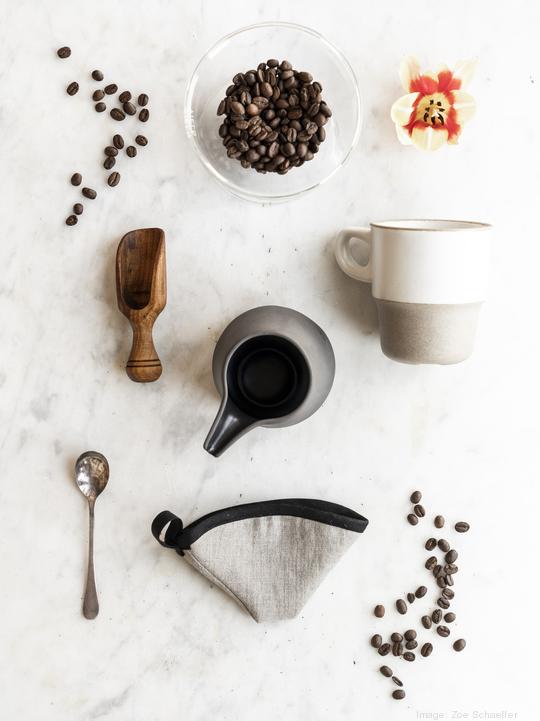
For Kitchen Garden Textiles, Barr sources reclaimed fabrics from local spots. That’s where she first came across large swaths of linen — appropriately from curtains once used on a theatrical set. Linen soon became her preferred fabric since it has “antibacterial qualities, it is stronger when it's wet than when it's dry, it's incredibly durable, is 100% biodegradable, [and] can be processed from plant to spinnable fiber without the use of chemicals,” she said. “It just hit all the buttons.”
The only catch was that it wasn’t readily available domestically.
She decided to change that — or, at least try. Last March, she teamed up with Emma de Long and her Kneehigh Farm in Pottstown. Together the pair launched the Pennsylvania Flax Project, which has a goal of growing flax locally. The crop is used to make linen and its byproduct has money-making uses beyond textiles, like animal bedding, mulch or building material, Barr said.
But because it’s not the easiest crop to process, it’s not readily grown in the U.S. Frustrated by the lack of domestic crops, Barr and de Long are hoping to change that. Last year, they planted about an eighth of an acre of flax, or about 18 pounds, of Nathalie flax seed, which they acquired through Lancaster-based Landis Valley Village and Farm Museum’s heritage seed program.
“It was our pandemic baby,” Barr joked.
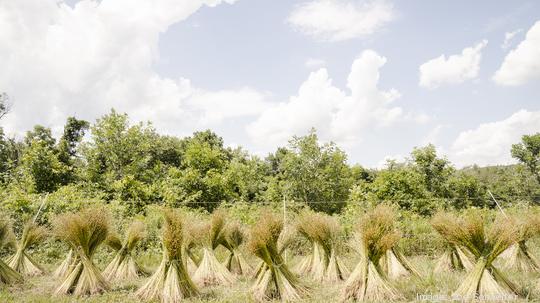
Flax takes on average around 100 days to grow and can be incorporated into regenerative farming practices or crop rotations. “It could, in a best-case scenario, replace monocrop heavily chemically fertilized things like corn and soy,” Barr said.
What began as a two-person mission quickly caught the interest of additional growers. In 2021, they distributed around 100 pounds of seed to 10 growers throughout the region, eight of whom agreed to participate in growing trials to see which varieties thrive in this climate and for their purposes.
Those growing trials will hopefully yield that napkin Barr likes to joke about. “It's in its beginning stages. We've got a long ways to go,” she said.
In the meantime, she sources her linen from a small mill in Lithuania, as well as yardage remnants which would otherwise be discarded. Accent fabrics are reclaimed, too, and Barr uses vintage textiles when she can find them.
While Barr began hand making her products, she now works with dedicated sewers, including a family-owned outfit in Allentown.
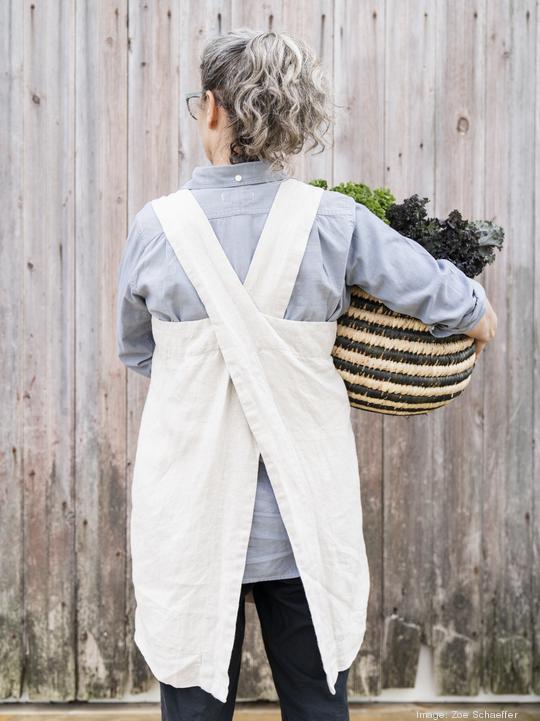
Most of Barr’s business shifted to e-commerce in the wake of the pandemic, but is stocked in several businesses throughout the region including Philly Foodworks in Sharon Hill.
While consumer sales are a big part of Barr’s business plan, so is napkin rentals. Partnering with restaurants and catering companies, she hopes to scale that business, which will also help reduce the polyester-based napkins many currently use. That segment of her business began in 2019 with Chef Ari Miller and Musi BYOB and grew to include River Twice in South Philadelphia and the now shuttered Cadence.
“I'm very optimistic about scaling that this coming year,” said Barr, noting it’s part of her “three-prong strategy.”
While revenue is currently “modest” — she declined to share figures — Barr said e-commerce really took off last year, growing by a factor of 10 in 2020 compared with 2019. Despite that big bump, she says sales have leveled off in 2021, but she remains hopeful about Kitchen Garden Textiles’ future.
“I would hope that my business will benefit my community,” she said.
Where does your passion for the environment stem from?
I've always been an environmentalist. I grew up in Eugene, Oregon, and I learned as a child how the watershed works and how important the environment is. So it's always been an underlying ethos for me.
How has business been since the pandemic started?
It's been so wildly up and down over the last 18 months. 2021 has been a very hard year for business. 2020 was actually better for me.
What’s the goal with Kitchen Garden Textiles?
My goal in this business has always been to raise awareness about the issue of textile production and use, and its ramifications for labor and the environment. It's a goal of mine to provide an alternative that's accessible to people for home textiles and also to get plastics out of the home. People need to start divesting from big oil in as many ways as possible, whether that's their portfolio or their kitchen.
What is your customer demographic?
I would say in the in the last two or three years, there's been a real shift in my demographic. I think when I started out, my demographic was very much 40-plus, dual income, kids in college or soon to be, with some more disposable income. And I've seen that really optimistically shift more toward people with young families and more the 25 to 35 group, which makes me really happy, not just because it bodes well for the future of my business, but because I like that that demographic is being reached with this message right now.
